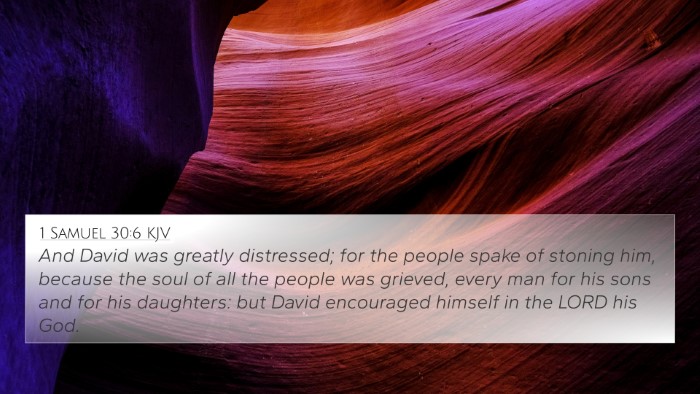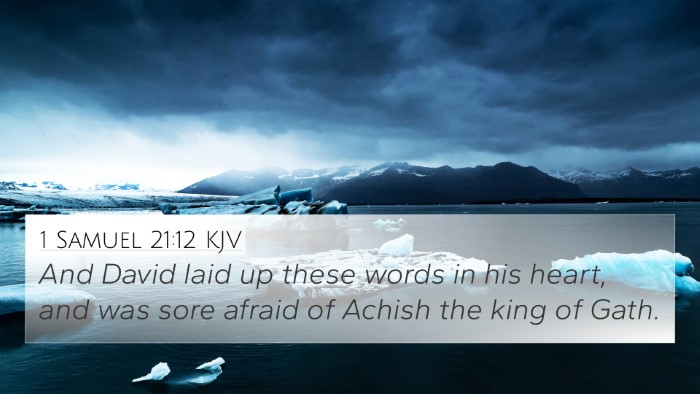Psalms 56:3 - Understanding the Verse
The verse Psalms 56:3 states, "When I am afraid, I put my trust in you." This succinct but profound statement encompasses a range of themes related to fear, trust, and reliance on God. Below, we explore the meaning of this verse through insights from prominent public domain commentaries.
Verse Context and Meaning
Psalms 56 is a passage authored by David during a time of peril when he was captured by the Philistines in Gath. This context is crucial; David articulates his fears but also demonstrates how his faith serves as a refuge.
Matthew Henry's Commentary
Matthew Henry notes that this verse encapsulates the human experience of fear. He highlights that fear is a common emotion, yet it is met with a remedy: placing one’s trust in God. David’s declaration reflects his conscious decision to rely on God amidst worries. This trust also implies an understanding of God’s sovereignty and care, as David anticipates divine intervention in his distress.
Albert Barnes' Notes
Albert Barnes elaborates on the phrase "put my trust in you," emphasizing that true trust in God is an active choice in moments of fear. He connects this response to other scriptural references that highlight the faithfulness of God. Barnes suggests that David, despite his circumstances, resolves to trust in God’s promises, mirroring sentiments seen in other scriptures such as Proverbs 3:5-6 and Isaiah 41:10, where trust in God is repeatedly encouraged.
Adam Clarke's Commentary
Adam Clarke provides an analytical reflection on the emotional state of David. Clarke emphasizes that fear can lead to worry and anxiety, yet David's response provides a template for believers today: turning fear into faith. He draws parallels to similar instances found within the Psalms and other books of the Bible, encouraging readers to look toward God rather than their fearful situations.
Cross-References for Psalms 56:3
This verse is interwoven with several other scriptures that echo themes of fear, trust, and divine protection. Here are some pertinent cross-references:
- Isaiah 41:10: "Fear not, for I am with you; be not dismayed, for I am your God."
- Proverbs 3:5-6: "Trust in the LORD with all your heart, and do not lean on your own understanding."
- Philippians 4:6-7: "Do not be anxious about anything, but in everything by prayer and supplication with thanksgiving let your requests be made known to God."
- Psalm 27:1: "The LORD is my light and my salvation; whom shall I fear?"
- 2 Timothy 1:7: "For God gave us a spirit not of fear but of power and love and self-control."
- Psalm 34:4: "I sought the LORD, and he answered me and delivered me from all my fears."
- Romans 8:31: "What then shall we say to these things? If God is for us, who can be against us?"
Thematic Connections
This verse invites reflection on broader themes in the Bible related to fear and trust. By comparing and cross-referencing similar passages, we can see a coherent biblical narrative encouraging faith amidst fear.
Scriptural Connections
- The Nature of Fear: Many verses address fear, emphasizing that it is a common human experience. Psalms 56 draws from themes in both the Old and New Testaments, illustrating how believers can boldly face life's uncertainties with faith.
- Trusting God: Other scriptures reinforce the importance of trusting God, a recurring theme that leads believers to seek divine comfort during trials. This includes references from Psalms as well as writings from Paul in the New Testament.
Tools for Bible Cross-Referencing
Understanding the connections between scripture enhances comprehension and provides a holistic view of biblical teachings. Here are some effective tools for Bible cross-referencing:
- Bible concordance
- Bible cross-reference guide
- Cohesive Bible study methods
- Digital Bible applications with built-in cross-reference tools
Conclusion
Psalms 56:3 encapsulates the essential human experience of fear while offering a faithful response: putting one’s trust in God. Various commentaries elucidate the fullness of this verse, revealing its connections to other scripts through the themes of trust and reliance on God. This understanding empowers believers today to navigate their fears with faith, employing cross-referencing as a tool to deepen their biblical understanding.
In summary, integrating Bible verses through comparative analysis and inter-Biblical dialogue allows for a comprehensive grasp of God's word, fortifying faith against life’s uncertainties.











